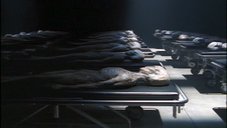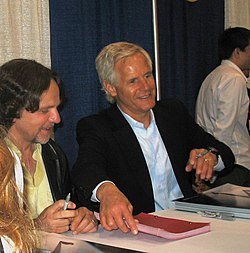Ratings
"Redux" first aired on November 2, 1997, on Fox in the United States, with "Redux II" airing on November 9. [11] "Redux" earned a Nielsen rating of 16.1, with a 22 share. It was viewed by 27.34 million people. It was the highest rated episode of the season, and the second highest watched episode, in terms of viewers, after "Leonard Betts", which aired after Super Bowl XXXI. [12] "Redux II" earned a Nielsen rating of 15.0, with a 21 share. It was viewed by 24.84 million people. [12] Part of the reason "Redux" was so widely viewed was because the show's previous episode, "Gethsemane", had created speculation about whether or not Mulder was actually dead. An article in The Wall Street Journal discussed fan theories behind Mulder's madness, while a cartoon ran in The New Yorker a few weeks later surrounding Mulder's "death". [13]
Reviews
"Redux" received mixed to negative reviews from critics. Emily VanDerWerff, writing for The A.V. Club , awarded the first episode a "C+" rating and wrote that "'Redux [Part 1]' was a pretty good episode back in 1997. It's not a very good episode now". [14] VanDerWerff noted that the idea that Mulder had killed himself was not effective, because the show's audience knew that a movie had been scheduled for release in the summer of 1998. [14] Finally, she called the episode's ending "one of the show's weaker cliffhangers". [14] Paula Vitaris from Cinefantastique gave the first part of the episode a negative review and awarded it one star out of four. [15] She heavily criticized the story's pacing, noting that the episode "is all plot, plot, plot. [And] much of the plot is unbelievable." [15] Furthermore, Vitaris criticized several plot holes in the episode, including Mulder's easy entrance into the Department of Defense and the character's antics, such as his attack on Ostelhoff. However, despite the overall negative review, Vitaris did mention that, "There's only one truly galvanizing scene, as that's the confrontation between Scully and Skinner after he follows her to the lab where she is performing her DNA test." [15] Robert Shearman and Lars Pearson, in their book Wanting to Believe: A Critical Guide to The X-Files, Millennium & The Lone Gunmen, rated the episode one star out of five. The two heavily criticized the "Skinner-as-traitor" plot, noting sardonically that "the production team aren't going to do [reveal he is the antagonist], and the shock 'villain in the room' reveal will be Section Chief Blevins–a character so important in the framework of the series that, barring his appearance in the Season Four finale, we haven't seen him in ninety-four episodes." [16] Not all reviews were so negative. Tom Kessenich, in his book Examination: An Unauthorized Look at Seasons 6–9 of the X-Files named "Redux" and "Redux II", together, as the tenth best "Episode of All Time". In his critique of "Redux", he noted "While many people don't care for 'Redux', I think it does a good job of preparing us for the second hour (although, it invalidates Gillian's emotional context from the S4 finale)." [17] In the 1999 FX Thanksgiving Marathon, containing fan-selected episodes, "Redux" (along with "Gethsemane" and "Redux II") was presented as the "Best Mythology Episode". [18]
"Redux II" received mixed to positive reviews from critics. Zack Handlen of The A.V. Club awarded the episode an "A" rating and noted that "whatever reservations I may have over a three-episode story arc, this final entry does a good job of re-investing us in the show's basic ideals, returning us to a rough form of the status quo in a way that's exciting, emotionally powerful, and satisfying despite only incremental forward momentum". [10] In addition, Handlen praised David Duchovny's performance, stating that he "was on fire the whole episode". [10] Tom Kessenich praised the second part of the episode and wrote "'Redux II' is the standout hour of the two without question. With Scully on her deathbed, Mulder meets his sister only to lose her again and is put in a position where he may deal with the devil. The finale moments ... are quite simply perfect and as good as any the show ever produced." [17] Shearman and Pearson rated the episode two-and-a-half stars out of five. The two noted "['Redux II'] is a likable enough little romp, but it's too leisurely to be exciting, too predictable to be revealing, and–most crucially, not really funny enough to be comedy. [19] Vitaris gave the second part of the episode a slightly less negative review than the first, but only awarded it one-and-a-half stars out of four. [15] She criticized the ending, noting that "it's all wrapped up neatly yet ambiguously." [15] However, Vitaris did note that "what makes 'Redux II' tolerable is Duchovny, who always hits the right notes of anger, despair, grief, relief, or emotional numbness." [15] In the 1999 FX Thanksgiving Marathon, containing fan-selected episodes, "Redux II" (along with "Gethsemane" and "Redux") was presented as the "Best Mythology Episode". [18]

